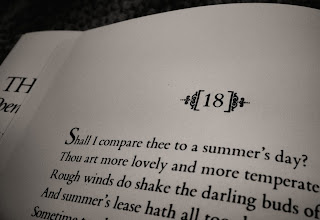On Sonnet XIIX
Shall I compare thee to a summer's day?
Thou art more lovely and more temperate:
Rough winds do shake the darling buds of May,
And summer's lease hath all too short a date:
Sometime too hot the eye of heaven shines,
And often is his gold complexion dimm'd;
And every fair from fair sometime declines,
By chance or nature's changing course untrimm'd;
But thy eternal summer shall not fade
Nor lose possession of that fair thou owest;
Nor shall Death brag thou wander'st in his shade,
When in eternal lines to time thou growest:
So long as men can breathe or eyes can see,
So long lives this, and this gives life to thee.
Perhaps the most
famous and beloved of Shakespeare’s 154 sonnets, sonnet 18 is special for me as
it is the first English poem I have committed to memory. In perfect iambic
pentameter (a poem whose lines are composed each of 5 pairs of syllables, with
the iamb meaning the pairs of syllables are unstressed-stressed i.e. da-dum) with one caesura (a pause in a
line of poetry) in the last line of the resolving couplet, which gives the last
three feet a wonderful prominence. Rolling the oscillating cadences of the syllables on one's tongue is a physical joy.
On the surface,
sonnet 18 is a straight-forward love poem. Shakespeare compares the object of his composition to
a summer’s day but who is more lovely, temperate and enduring; the endurance of the
loveliness aided by his ‘eternal lines’, which ‘gives life to thee’, thus
preserving the loveliness forever. The most natural conclusion upon reading
this poem is that the object of praise is a female object of admiration, reverence and
desire. However, no gender-defining pronouns are used. Neither are any physical qualities of
the beloved stated. In fact, the majority exegesis is that Shakespeare wrote
it in praise of a male friend, the mysterious Mr W.H. who was the recipient of
an oblique dedication. T.T., the dedicator, is taken to be the publisher, one Thomas Thorpe.
TO.THE.ONLIE.BEGETTER.OF.
THESE.INSUING.SONNETS.
Mr.W.H. ALL.HAPPINESSE.
AND.THAT.ETERNITIE.
PROMISED.
BY.
OUR.EVER-LIVING.POET.
WISHETH.
THE.WELL-WISHING.
ADVENTURER.IN.
SETTING.
FORTH .
THESE.INSUING.SONNETS.
Mr.W.H. ALL.HAPPINESSE.
AND.THAT.ETERNITIE.
PROMISED.
BY.
OUR.EVER-LIVING.POET.
WISHETH.
THE.WELL-WISHING.
ADVENTURER.IN.
SETTING.
T.T.
Furthermore, 126 of
the sonnets are addressed to a young man, something to which the first 17 sonnets all share in common. Theories and speculations are rife as
to the identity of the subject – the front runner being William Herbert, Duke of Pembroke, a patron of Shakespeare. Bertrand Russell played with the idea in his memoir that
W.H may be a typo of Shakespeare’s initials W.S. or W.Sh. This stands if ‘onlie’ is
read to mean ‘single' or 'sole’ and ‘begetter’ as ‘writer' or 'creator’. Therefore it may be Thorpe’s
dedication to Shakespeare, the author of the ‘insuing sonnets’.
However, another intriguing
possibility is that the poem is written by Shakespeare in the memory of his dead
son, Hamnet, who died at the age of 11 about a year before the sonnet was
composed. Read in this light, the poem takes on an entirely different nuance.
The emphasis shifts to the transience of youth and life in his metaphor of
summer’s faults:
Rough winds do shake the darling buds
of May,
And summer's lease hath all too short a date:
Sometime too hot the eye of heaven shines,
And often is his gold complexion dimm'd;
And every fair from fair sometime declines,
By chance or nature's changing course untrimm'd;
And summer's lease hath all too short a date:
Sometime too hot the eye of heaven shines,
And often is his gold complexion dimm'd;
And every fair from fair sometime declines,
By chance or nature's changing course untrimm'd;
The last part of the poem reads as a
melancholic yet determined effort to recrudesce the image of his beloved child
and to preserve that love in an amber of words; to defy the shadow of death and mist of time and
to ensure a modicum of immortality for his son.
Nor shall Death brag thou wander'st in his shade,
When in eternal lines to time thou growest:
So long as men can breathe or eyes can see,
So long lives this, and this gives life to thee.
When in eternal lines to time thou growest:
So long as men can breathe or eyes can see,
So long lives this, and this gives life to thee.
The final rhyming
couplet, which resolves the sonnet, carries with it a lot of emotional weight
without being expressively sentimental when read in this light but gives a
sense of sorrowful solace. Perhaps tellingly, sonnet 18 is the first of the
sonnets not to recommend young men to attain immortality through the begetting
of children. This interpretation, whilst not the most accepted, is my personal
favourite. In the wonderful film ‘Venus’, starring Peter O’toole, the young
female protagonist, the niece of a friend, tells him of her experience of
abortion. After a deep silence, he recited to her sonnet 18. Peter O’toole, a
consummate Shakespearean actor and scholar, has said he can recite all of Shakespeare’s
sonnets. This particular sonnet, spoken in his clearly enunciated, subtly
emotional and aging voice in the atmosphere of grief, perfectly encapsulated
the notion of the poem in this view.
http://www.youtube.com/watch?v=iRIxb6_ELNg
http://www.youtube.com/watch?v=iRIxb6_ELNg
Whether read as a
love poem to a man or a woman or a requiem to a dead child by his father,
sonnet 18 will live on as an exemplary and graceful expression of love.



Comments
Post a Comment